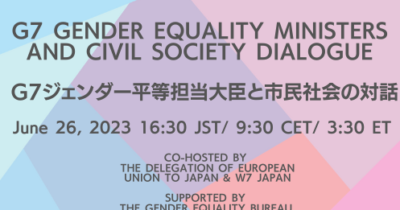On 21 April 2023, Civil 7 (C7) , together with Labour 7 (L7), issued a joint statement to calling on G7 leaders to take concrete actions to put people and the planet first, to foster peace and international cooperation, as well as to protect and uphold human rights, including fundamental principles and rights at work.
Please refer to the statement (PDF) from here.
Japanese version can be also downloaded from here.
Contact: Aoi Horiuchi / Kyoka Oimatsu, C7 Secretariat, <[email protected]>
Civil Society 7 and Labour 7 to the G7 Leaders’ Summit, 2023
Joint Statement of the Civil Society 7 and the Labour 7
21 April 2023
The world is facing unprecedented challenges and has entered into an era of geopolitical, economic and social uncertainty, marked by the aggression of Ukraine by the Russian Federation, the lingering effects of the Covid-19 pandemic, digitalization and the acceleration of climate change. The current global economic slowdown, inflation and the cost-of-living crisis hit the poorest, the weakest, and the vulnerable hardest. The rise of inequalities, between and within countries, as well as the loss of hope in a better future, challenges trust and social cohesion, the foundations of democratic societies, including in the G7.
In this context, the Civil Society 7 (C7) and the Labour 7 (L7) join their voices to call on G7 leaders to take concrete actions to put people and the planet first, to foster peace and international cooperation, as well as to protect and uphold human rights, including fundamental principles and rights at work. Climate action and social justice should be the cornerstones of the G7’s response to the ongoing crises.
Investment in universal social protection is urgently needed to protect people from crises, mitigate the impact of shocks and foster a just transition to carbon neutral economy that reduces inequalities. Universal social protection is key to guarantee fundamental human rights and build a resilient and inclusive labour market, while stimulate economic activities. The Global Fund for Social Protection can become a unique tool to construct safety nets and strengthen social protection systems.
The C7 and L7 urge the G7 to commit to create an environment where people can work safely and make a decent living. While in-work poverty is increasing for the first time in decades, we call on G7 Leaders to support pay rises and to facilitate collective bargaining as a tool to ensure that all workers enjoy fair wages and decent working conditions. States have a duty to ensure respect for fundamental human rights including labour rights in line with the core ILO conventions, the ILO Forced Labour Protocol, and the UN Guiding Principles of Business and Human Rights.
However, the current international legal framework does not provide an adequate response to these challenges and to human rights violations in global supply chains. We urge G7 members to step up to their responsibility and actively promote the adoption of a binding, mandatory human rights and due diligence standard. Such an instrument is essential to protect workers in vulnerable situations from exploitation, promote responsible business conduct and promote adequate remedies, not only in the companies’ home countries but in their operations worldwide. Governments also have a duty to protect environment and human rights defenders and whistleblowers from intimidation and retaliation.
In particular, we call on G7 leaders to take immediate and concrete action to end child labour by 2025 and forced labour, modern slavery and human trafficking by 2030, as targeted in SDG 8.7, and strengthen monitoring and assessment on progress made. The number of victims of child labour has reached over 160 million worldwide and is on the increase, mainly in Africa and in agriculture. Children account for 12% of the total victims of forced labour. Children are disproportionately affected by economic, climate, health and humanitarian crises, and are at greater risk of hazardous work, becoming child solders and subjected to forced labour, forced marriage, sexual exploitation, and human trafficking.
We recall the G7 Leaders’ Communiqués adopted in 2021 and 2022 and the commitments made to eradicate the use of all forms of forced labour in global supply chains, including state-sponsored forced labour, and tackling child labour. We call on G7 leaders to develop regulatory frameworks and enforcement mechanisms to eliminate child labour and forced labour, including through levers such as import controls, trade agreements and public procurement policies.
We call on all G7 countries to develop National Action Plans for the elimination of child labour, which is required for all countries that have ratified the Worst Forms of Child Labour Convention (ILO No. 182), as endorsed in the Durban Call to Action on the Elimination of Child Labour. We call on all G7 members to become partner and pathfinder countries of Alliance 8.7. We also urge G7 leaders to provide support to developing countries, including through technical assistance projects to strengthen labour inspection and other relevant authorities. Collective action, sectoral and area-based approaches are key to eliminate child labour and forced labour.
The G7 Summit takes place this year in Hiroshima. Beyond the symbol, it is time for G7 Leaders to rise to the occasion and to fully implement past commitments to promote peace, climate action, sustainable economic growth, resilient and inclusive labour markets, quality employment and decent work for all. We, the representatives of civil society and trade unions in G7 member countries, stand ready to work together to achieve these goals.




